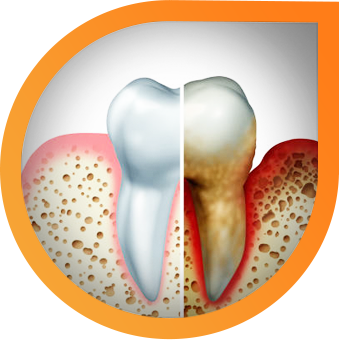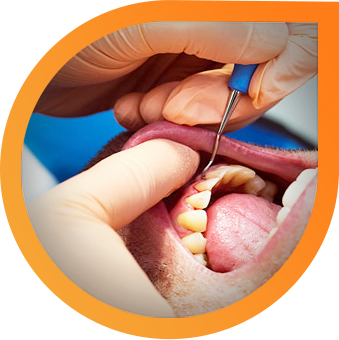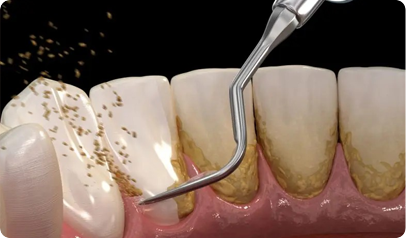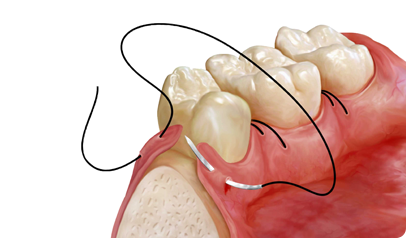Keeping gums healthy is as important as maintaining healthy teeth, as they work together to sustain our oral health. Gum disease occurs in two stages. The first stage, Gingivitis, involves swelling, bleeding, and redness caused by dental plaque build-up along the gum line. If untreated, it progresses to the second stage, Periodontitis, which is an advanced form of Gingivitis. This stage is marked by gum recession, pocket formation between the tooth and gum, bone loss, and symptoms like pain, redness, swelling, bleeding, bad breath, and eventual tooth loss. Depending on the severity, treatments like scaling, root planning, flap surgeries, or regenerative therapy may be required. For effective management of gum disease, consulting a skilled Periodontist in Vijayawada can help ensure the best care for your oral health.
With above procedures proper brushing and flossing will help relieve the proble. To prevent gum disease, regular check-ups are highly recommended.
It’s important to spot the early signs of gum disease and tackle them before they turn into something more serious. Here’s what to look out for:
If you experience any of the above symptoms, make an appointment to see your dentist. While these symptoms aren’t always an indication of gum disease, it’s important to receive a professional diagnosis. To assess the extent of your gum disease, your dentist or a periodontist in Vijayawada will carefully examine your gums. They may also need to take X-rays to check your bone levels.


Gum disease is usually caused by a build-up of plaque, which contains bacteria that irritate your gums. For most patients, the early signs of gum disease can be treated by improving their oral hygiene routine and ensuring plaque is effectively removed daily by brushing and flossing. When plaque is left on the teeth, it eventually turns into tartar, also known as calculus. If this occurs, it is important to visit your dentist or a periodontist in Vijayawada, who can remove the tartar using specialized tools and provide expert care to restore your gum health.
If your gum disease is more advanced, you will need more proactive treatment and we may refer you to see a specialist periodontist. A periodontist is a dental specialist who has been specially trained to treat and manage conditions affecting the gums and bone.
This involves carefully cleaning the roots of your teeth to remove plaque and tartar.
This is similar to root planing but more thorough. It includes cleaning the root surface as well as the pocket between your gums and teeth and the underlying tissues.
If gums have receded, they can sometimes be ‘rebuilt’ through a gum graft, where tissue is taken from another area to replace what’s been lost.


Flap surgery is a leading method performed by a periodontist in Vijayawada for treating and repairing periodontal pockets. After anaesthesia takes effect, a small incision is made to separate the gums from the teeth. The outer gum tissue is gently folded back, allowing access to the roots and the supporting ligament and bone tissue for effective treatment.
Next, the inflamed gum tissue can be removed, and the tooth roots can be cleaned; if needed, the area may also be treated with antibiotics or other medications. Bone defects can be repaired with grafting material using bone from a different area of your mouth or body, or synthetic bone.
This involves stimulating and guiding the growth of your bone and soft tissues using barrier membranes. These membranes keep the gum tissue and bone separate so they can regrow in the correct proportions.
If a tooth cannot be saved it may be necessary to remove it and replace it with a bridge, dental implant or denture.
Sometimes your dentist or periodontist will prescribe antibiotics to take during your treatment. Some treatments such as root planning may also require a local anaesthetic to ensure you don’t experience any discomfort. Dental treatments carry risks. Before proceeding, you should seek an opinion from an appropriately qualified health practitioner.


Recently I took root canal treatment from SUSHMA DENTAL CLINIC, Am very happy with thier treatment and I would recommend my friends & relatives to Sushma Dental Clinic if they have any dental problems. Dr.Sushma perfectly identifying our dental problem and suggesting us for the best possible treatment to clear our problem. She is clearing all our doubts and giving us the best treatment. Front office staff is also too good and they keep reminding about our appointments. I can recommend this is one of the best dental hospital in Vijayawada.






Dr.Sushma has moto to serve the society for bright smile on there faces…she explains every step and procedure to provide as much as information she can and provide best clinical experience I suggest to visit Sushma dental care for best dental treatment.






I would prefer saying this is one of the best dental Hospital in Vijayawada. Dr. Sushma garu is an excellent dentist whose main priority is making sure her patients are comfortable...






© Dr Sushma dental. All Rights Reserved. | Website Designed & Developed by Glint Creatives